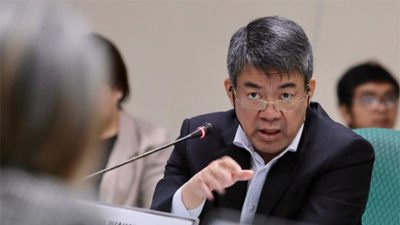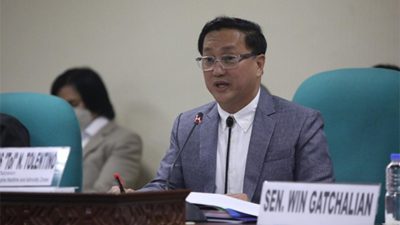MANILA – President Ferdinand R. Marcos Jr. has prioritized the increase in capability and in the number of health facilities nationwide.
“Our healthcare system is undergoing structural enhancements. Last year, more than 3,400 projects were completed,” Marcos said in his second State of the Nation Address (SONA) on Monday.
Specialty centers in various fields are being established and integrated into the government hospitals and about 60 of them have been opened to the public to improve capacity for specialized medical treatment, he said.
Among these include the Clark Multi Specialty Medical Center (CMSMC) in Pampanga which started construction this month.
Equipped with cutting-edge facilities, the CMSMC aims to provide topnotch medical care to its patients through a comprehensive range of specialized departments, including heart, kidney, cancer, and pediatric centers.
The CMSMC is a result of the collaboration between the Department of Health, the Philippine Amusement and Gaming Corporation, the Clark Development Corporation, Pampanga local government units, and in partnership with the private sector like the Bloomberry Cultural Foundation Inc.
The DOH considers the CMSMC a pioneering catalyst for transformative change in establishing specialized medical centers nationwide as it provides improved accessibility to advanced medical services.
Meanwhile, residents of Central Luzon needing the services of interventional cardiac procedures and non-cardiac procedures under interventional radiology (both vascular and non-vascular) no longer have to travel to Manila.
This is after a new Catheterization Laboratory (CathLab) at the Jose B. Lingad Memorial General Hospital in San Fernando, Pampanga opened on March 24.
Its construction was made possible through the Health Facilities Enhancement Program and in coordination with provincial and local government units.
The construction fund was taken out of the PHP1 billion-budget given to the hospital in 2013 for the completion of its equipment and buildings.
It was completed in 120 days so it can immediately cater to all diseases faced by the patients in the region.
To ensure that Filipinos nationwide receive specialized medical care, the President signed Executive Order No. 19, series of 2023, directing the establishment of the Philippine Heart Center Annex at the Clark Freeport Zone last March 10.
The Cancer Institute and Oxygen Generating Plant of Cotabato Regional and Medical Center was also inaugurated on June 22 this year.
The oxygen-generating plant aims to provide local hospitals with sufficient supplies of medical oxygen which significantly increased in price when the Covid-19 pandemic started.
To date, the DOH has 46 specialty centers and 26 hospitals nationwide.
The Philippine Health Insurance Corporation also supports the Marcos administration as it works on a more direct and efficient delivery of services.
In PhilHealth’s Improved Konsulta Package, about 21 types of medicines and 13 laboratory services will be provided for free. Currently, there are over 2,000 Konsulta centers nationwide — a 35 percent increase in number from last year.
To better help patients suffering from kidney disease, the PhilHealth increased the number of free dialysis sessions to 156 from last year’s 90 sessions.
The price of important and primary medicines decreased by 40 percent while other medicines have decreased by 90 percent.
“Aside from the maximum retail price regulation being implemented, strategic VAT exemption also lowered the prices of 59 essential medications, such as those for cancer, diabetes, hypertension, kidney disease, and mental illness,” Marcos said.
As the government continues to push for free health services for all, more than 93 percent of Filipinos are already members of the PhilHealth to date.
In the past year, over 3.4 millions Filipinos received help from the government through the DOH’s Medical Assistance for Indigent Patients program.
The Marcos administration is also keen to pursue measures for the improvement of the welfare of doctors, nurses, and other medical front-liners.
“Upang masuklian ang naging sakripisyo ng ating mga health workers sa pribado at pampublikong mga ospital noong nakaraang pandemya, ipapamahagi na sa kanila ang kanilang COVID health emergency allowance at iba pang mga nabinbing benepisyo (To repay the sacrifices of our healthcare workers in public and private hospitals during the pandemic, the COVID health emergency allowance will be distributed to them together with all their pending benefits),” Marcos said.
Four bills have already been filed in the House of the Representatives and the Senate on the amendment of the Magna Carta of Public Health Workers.
The DOH bill version for the said legislation includes ongoing staff work along with the the salary standardization for human resources for health.
Nutrition, feeding programs
“We are now refocusing our health priorities, applying the lessons learnt from the pandemic and addressing the weaknesses that it has exposed. Healthier communities and lifestyles are our advocacy,” Marcos said.
The Marcos administration has also launched convergent programs to address hunger and nutrition-related issues especially among the children, like stunting and wasting.
The government introduced the pilot Food Stamp Program (FSP) which seeks to supply the nutrition needs of the million most food-poor Filipinos while complementing the current nutrition continuity programs, such as the First 1,000 Days initiative which ensures nourishment for the first three years of the child’s life.
The supplemental feeding program is for children attending daycare centers. The K-to-6 Program shall feed Kindergarten to Grade 6 public school students, who are suffering from severe wasting.
Vaccination for all
“We are catching up on the routine vaccinations of our children. As of this year, more than 80 percent of our eligible children have been vaccinated against measles, rubella, and polio,” Marcos said.
“Nananawagan ako sa lahat ng mga magulang na kumpletuhin ang mga bakuna ng kanilang mga anak, at magtungo sa pinakamalapit na health center para sa mga libreng bakuna (I’m calling on parents to complete the vaccination of their children and go to the nearest health centers for free vaccines).”
The DOH, through its MRV-OPV supplemental immunization activity or Chikiting Ligtas from May 1 to June 15, has vaccinated 8,016,954 or 82.61 percent of the target children against measles and rubella as of June 8.
About 2,307,564 children or 80.5 percent received bivalent oral polio vaccines while a total of 3,884,629 children have received vitamin A supplementation.
The Marcos administration also continued the rollout of booster doses for the fully-vaccinated against the coronavirus disease 2019 (Covid-19).
The Public Health Operations Centers conducted the Bakunahang Bayan II: Special Covid-19 Vaccination Days from December 5 to 7, 2022 where an average of 36, 693 jabs for the booster dose and 8,727 jabs for the primary doses were done for the five to 11 years old population.
For the bivalent Covid-19 vaccines, the DOH started its rollout on June 21 at the Philippine Heart Center in Quezon City for 500 healthcare workers.
The country has received 391,860 doses of Comirnaty Pfizer-BioNtech-adapted bivalent vaccines from the government of Lithuania on June 3.
The doses were allocated to all DOH-Centers for Health Development and the Ministry of Health-Bangsamoro Autonomous Region in Muslim Mindanao. (PNA)







